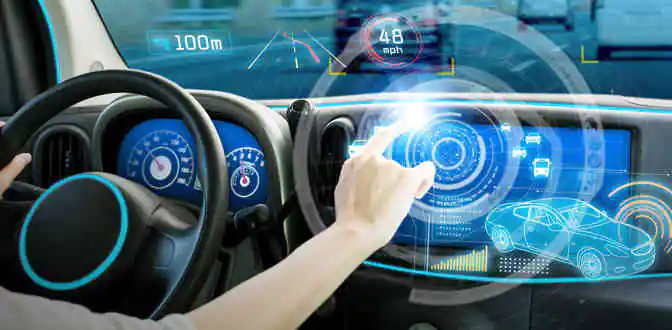Hailed as the future of the transportation industry, truck platooning is one of the latest innovations in the transport sector. A truck platoon basically consists of multiple trucks, which travel at an aerodynamically efficient distance and at the same time cooperate in maintaining distance at high speeds. These trucks are driven by smart technology and communicate with each other.
How does truck platooning work?
With the help of wireless connectivity, trucks in the platoon are able to communicate. Sensors play a crucial role in maintaining distance between the moving trucks. The sensors also detect road conditions and other driving scenarios based on which trucks in the platoon synchronize speed and braking actions.
The trucks in the platoon are equipped with vehicle-to-vehicle (V2V) and vehicle-to-infrastructure (V2I) connectivity, stereo cameras placed behind the windshield, and radar sensors (LiDAR, for example) at their front and sides. The trucks are also equipped with advanced driver assistance systems (ADAS) through which automatic braking and acceleration for safe travel is enabled. Along with these features, emergency braking, adaptive cruise control systems, lane-keep assist systems etc. are also enabled by the ADAS.
With the use of telematics in passenger cars and commercial vehicle segment, truck platooning is now seen as an essential feature in the domain of self-driven trucks.
Traffic safety, cost-efficiency and a boost to the flow of traffic are some of the major advantages of truck platooning. The global truck platooning systems market saw a shipment of 780,000 units in 2015 and the number is expected to reach 1.79 million units by 2020. According to the experts at Technavio, the market is expected to grow at a CAGR of 18.09% by the year 2020.
Top 12 Vendors in the Global Automotive Truck Platooning Systems Market
Peloton
Based in Silicon Valley, California, Peloton Technology is a market leader in truck platooning systems development. The company’s platooning technology helps truck operators to achieve considerable cost savings. It is one of the leading companies that has revolutionized the world of automated vehicles by ushering in ground-breaking safety, efficiency and data intelligence to the trucking industry.
Volvo
A well-known name in the world of automobiles, the Volvo Group manufactures trucks, buses, construction equipment, marine and industrial engines. It has been an active participant in the development of truck platooning technologies, and is involved in several projects where technology is being tested and verified. In the year 2015, the firm made an investment in Peloton Technology to contribute to the development of platooning technologies.
Scania
Headquartered in Sweden, Scania offers heavy trucks, buses, engines, and services with a focus on low-carbon solutions. The company is actively involved in the development of truck platooning systems. Scania uses inter-vehicle communications and allows heavy vehicles to sustain fuel-efficient, aerodynamic formations in long-distance travels.
Daimler
Daimler is one of the biggest producers of premium cars and one of the biggest manufacturers of commercial vehicles with global reach. Daimler’s Highway Pilot Connect system enables truck platooning and its trucks are equipped with approximately 400 sensors per vehicle. The company was also one of the participants in the European Truck Platooning Challenge held in 2016.
TomTom
A world leader in fleet management and telematics, TomTom and Simacan have recently produced an online tool based on GPS. This system tracks the progress of truck platoons and the various incidents they encounter on their way; these may include road works, tailbacks, and accidents.
Navistar
A leading manufacturer of commercial trucks, buses, defense vehicles and engines, Navistar plunged into truck platooning in the year 2016.
Meritor WABCO
Meritor WABCO focuses on the development and delivery of proven, integrated safety technology and efficiency components, including braking systems and controls, active safety systems, and suspension and control systems for commercial vehicles in North America. The firm’s anti-collision and safety control systems enable adaptive cruise control systems and autonomous braking in truck platooning systems. Meritor Wabco, Peloton, and Denso have collaborated to showcase truck platooning technologies.
PACCAR
PACCAR is a global technology leader in the design, manufacture and customer support of high-quality premium trucks. A Fortune 500 company, it is among the largest manufacturers of medium and heavy duty trucks in the world. PACCAR, also provides financial services and information technology and distributes truck parts related to its principal business.
MAN
Headquartered in Munich, MAN Truck & Bus is one of the largest subsidiaries of MAN SE Corporation and is a leading international provider of commercial vehicles. MAN trucks and Scania trucks (Volkswagen) rely on digitally connected trucks. Along with Scania, MAN participated in the 2016 European Truck Platooning Challenge.
IVECO
Industrial Vehicles Corporation or IVECO is an Italian industrial vehicle manufacturing company. Also a manufacturer and supplier of commercial trucks, parts, and diesel engines, its two-truck platoon of semi-autonomous trucks traveled from Brussels to Rotterdam with the aim of demonstrating reduced fuel consumption at the European Truck Platooning Challenge in April 2016.
Hino
The third largest truck manufacturer in the world, Hino is a Japanese manufacturer of commercial vehicles and diesel engines. It is an active participant in truck platooning projects which included the Japan Energy ITS automated truck platoon project.
Continental
The world’s fourth-largest manufacturer of tyres, Continental AG is a leading German automotive manufacturing company that specialises in brake systems, automotive safety, tachographs etc. Hi-res 3D flash LiDAR, SRL-CAM400 sensor module and SRL-1/SRL 1C are some of its leading products.



